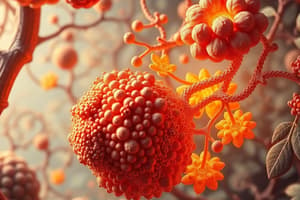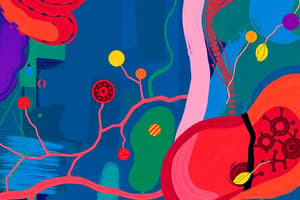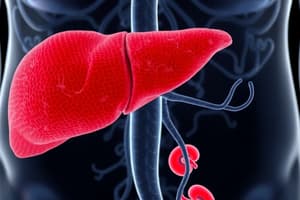Podcast
Questions and Answers
Which of the following compounds can serve as a precursor for gluconeogenesis?
Which of the following compounds can serve as a precursor for gluconeogenesis?
- Nucleotides
- Lactate (correct)
- Cholesterol
- Triglycerides
In which cellular compartment does most gluconeogenesis primarily occur?
In which cellular compartment does most gluconeogenesis primarily occur?
- Nucleus
- Endoplasmic Reticulum
- Mitochondria
- Cytosol (correct)
Which organ plays the most significant role in gluconeogenesis?
Which organ plays the most significant role in gluconeogenesis?
- Heart
- Pancreas
- Kidneys
- Liver (correct)
Which of these tissues rely exclusively on glucose for energy supply?
Which of these tissues rely exclusively on glucose for energy supply?
Which of the following is NOT a major precursor for gluconeogenesis?
Which of the following is NOT a major precursor for gluconeogenesis?
Flashcards are hidden until you start studying
Study Notes
What is Gluconeogenesis?
- Gluconeogenesis is the process of creating glucose from non-carbohydrate sources.
- This process is crucial for maintaining blood glucose levels when carbohydrate intake is low.
- Key precursors for gluconeogenesis are lactate, pyruvate, glucogenic amino acids, propionate, and glycerol.
Where Does Gluconeogenesis Take Place?
- The process mostly occurs in the cytosol of liver cells.
- Some precursors are produced in mitochondria.
- The kidneys also contribute to gluconeogenesis to a lesser extent.
Importance of Gluconeogenesis
- Several vital organs rely solely on glucose for energy, including the brain, central nervous system, erythrocytes, testes, and kidney medulla.
- Glucose is the only source of energy for skeletal muscles and red blood cells under anaerobic conditions.
- This emphasizes the importance of gluconeogenesis in maintaining energy supply, even in times of limited carbohydrate availability.
Studying That Suits You
Use AI to generate personalized quizzes and flashcards to suit your learning preferences.




